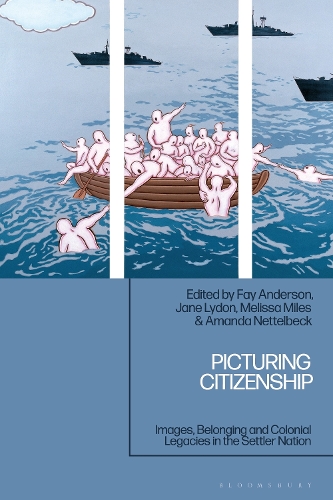
Picturing Citizenship: Images, Belonging and Colonial Legacies in the Settler Nation
(Hardback)
Publishing Details
Picturing Citizenship: Images, Belonging and Colonial Legacies in the Settler Nation
By (Author) Fay Anderson
Edited by Jane Lydon
Edited by Melissa Miles
Edited by Professor Amanda Nettelbeck
Bloomsbury Publishing PLC
Bloomsbury Academic
21st August 2025
United Kingdom
Classifications
Tertiary Education
Non Fiction
Colonialism and imperialism
General and world history
909
Physical Properties
Hardback
264
Width 158mm, Height 236mm, Spine 22mm
640g
Description
For many, the conditions and privileges of citizenship, and the access it provides to equal civil, political and social rights, are taken for granted. Yet citizenship always implies histories of inclusion and exclusion and in settler nations with colonial roots, the history of citizenship is entangled with the legacies of colonisation. Looking beyond its legal definition to the wider historical processes through which citizenship and its associated ideas of rights and belonging have been imagined, debated and found lasting form, this collection considers the unique role of visual culture in defining, contesting and advancing ideas of citizenship in settler national contexts from the 19th century to the present day.
Addressing citizenships particular entanglements with colonial histories in contemporary settler nations, the collection considers how images have shaped the meanings and experiences of citizenship from the colonial era, through periods of mass global migration to contemporary geopolitical change and debates on Indigenous rights and recognition. Contributors explore the role visual culture has played in imagining or interrogating ideas about belonging, rights, civic identity, and the ideal citizen in societies that continue to grapple with their settler colonial origins. They ask how image-making may be used to negotiate or contest the limits of citizenship, whether as a legal or as an imagined cultural category, and the role of visual culture in building relationships between citizens, non-citizens and the state. This collection will provide a new and compelling history of citizenship and the ways it has been defined, not only by historicising citizenships visual imagery but by exploring its present effects and legacies.
Author Bio
Fay Anderson is Associate Professor of Media History at Monash University, Australia. She has published widely on Australian and journalism history, news photography, war, genocide, trauma, migration and crime. She is the author of The Holocaust and Australian Journalism: Reporting and Reckoning (2023).
Jane Lydon is the Wesfarmers Chair of Australian History at the University of Western Australia. Her books include Imperial Emotions: The Politics of Empathy across the British Empire (2020) and Photography, Humanitarianism, Empire (2016) which explores the role of photography in shaping ideas about race and difference from the 1840s to the 1948 Declaration of Human Rights.
Melissa Miles is Professor of Art History at Monash University, Australia. Her books include Photography, Truth and Reconciliation, Pacific Exposures: Photography and the Australia-Japan Relationship (with Robin Gerster) and The Language of Light and Dark, which examines the productive role of visual culture in public life, politics and intercultural relations.
Amanda Nettelbeck is Professor of History in the Institute of Humanities & Social Sciences, Australian Catholic University. Her last book Indigenous Rights and Colonial Subjecthood (2019) won the 2020 ANZLHS Legal History Prize, and her current book project explores how ideas of colonial citizenship were produced and contested in the 19th century settler empire.
